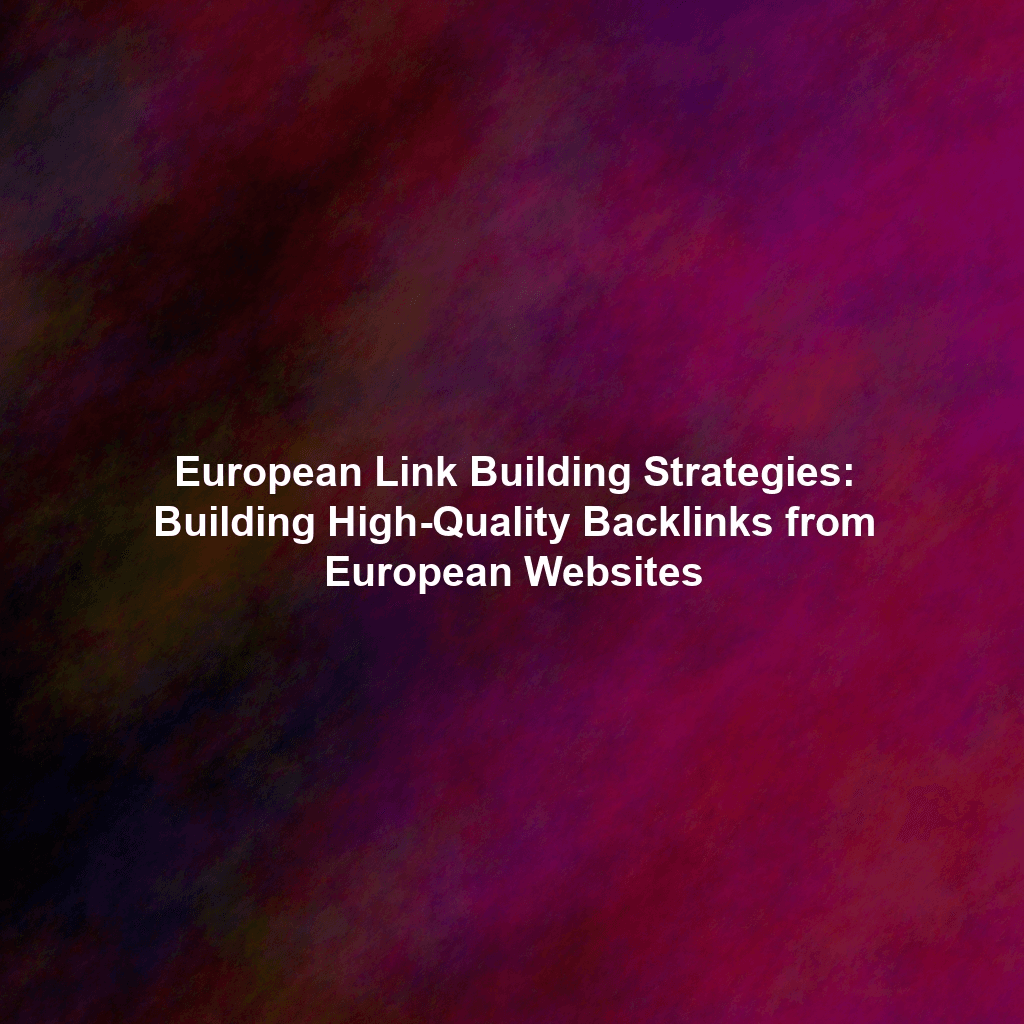In the ever-evolving world of Search Engine Optimization (SEO), link building remains a cornerstone for achieving higher rankings and increased organic traffic. However, a globally-focused approach might not always cut it. If your target audience resides primarily in Europe, tailoring your link building efforts specifically for the European market is crucial. This article delves into effective link building strategies for acquiring high-quality backlinks from reputable European websites, ultimately boosting your domain authority and search rankings within the European landscape.
Understanding the European SEO Landscape
Before diving into specific strategies, it’s vital to understand the nuances of the European SEO landscape. Unlike the US, Europe is a continent of diverse languages, cultures, and search engine preferences. While Google dominates in many countries, other search engines like Yandex in Russia or Seznam in the Czech Republic hold significant market share. Furthermore, each country has its own set of popular websites, news outlets, and industry-specific directories. A one-size-fits-all approach is simply ineffective. Localization and cultural sensitivity are key to success.
The Importance of Language-Specific Link Building
One of the most critical aspects of European link building is language. Backlinks from websites in the language of your target market are significantly more valuable than those from English-language websites. If you’re targeting Germany, for example, prioritize obtaining backlinks from German websites with German content. This signals to search engines that your website is relevant to German users.
Effective European Link Building Strategies
Here are several proven strategies for acquiring high-quality backlinks from reputable European websites:
Guest Blogging: Share Your Expertise
Guest blogging remains a powerful link building tactic. Identify reputable websites and blogs in your niche that cater to a European audience. Offer to contribute valuable, original content that aligns with their audience’s interests. In return, you can include a contextual backlink to your website within the article or author bio. Remember to adhere to the website’s editorial guidelines and prioritize quality over quantity. A well-researched, insightful guest post is far more valuable than a generic, low-quality one.
Resource Link Building: Become a Valuable Source
Resource link building involves creating valuable, informative content that other websites will naturally want to link to. This could include:
- Comprehensive Guides: Create in-depth guides on topics relevant to your industry and the European market.
- Infographics: Design visually appealing infographics that present complex data in an easy-to-understand format.
- Original Research: Conduct original research and publish your findings, making your website a go-to source for data.
- Tools and Calculators: Develop free tools or calculators that are useful for users in your niche.
Once you’ve created valuable resources, promote them to relevant websites and bloggers in your industry. Let them know how your resource can benefit their audience and encourage them to link to it.
Broken Link Building: Find and Fix
Broken link building involves identifying broken links on relevant websites and offering to replace them with links to your own content. This is a win-win situation: you help the website owner fix a broken link, and you gain a valuable backlink in return. Use tools like Ahrefs or Semrush to find broken links on relevant European websites. Then, reach out to the website owner and suggest your content as a replacement.
Local Citations and Directories: Establish Your Presence
Local citations are online mentions of your business name, address, and phone number (NAP). Building local citations on reputable European business directories can improve your local search rankings and attract more customers. Research relevant directories in your target countries and ensure your NAP information is consistent across all platforms. Examples include Yelp (if applicable to the specific European country), local industry-specific directories, and government business registers.
Building Relationships with European Influencers
Connecting with influencers in your niche within Europe can be extremely beneficial. This could involve bloggers, journalists, or industry experts. Building relationships with these individuals can lead to opportunities for collaborations, mentions, and backlinks. Engage with their content, attend industry events, and offer valuable insights to build rapport.
Participating in Relevant European Forums and Communities
Active participation in relevant online forums and communities can help you establish yourself as an authority in your niche and build relationships with potential link partners. Share your expertise, answer questions, and provide valuable insights. While directly promoting your website within forum posts may not always be appropriate, you can often include a link to your website in your profile or signature.
PR and Media Outreach: Earn Editorial Links
Public relations and media outreach can be a highly effective way to earn high-quality editorial backlinks from reputable news outlets and industry publications. Develop compelling press releases and stories that are relevant to the European market. Target journalists and editors who cover your industry and pitch them your story. A successful PR campaign can generate significant brand awareness and valuable backlinks.
Measuring and Analyzing Your Link Building Efforts
It’s crucial to track and analyze your link building efforts to determine what’s working and what’s not. Monitor your website’s domain authority, organic traffic, and keyword rankings. Use tools like Google Analytics, Google Search Console, Ahrefs, or Semrush to track your progress and identify areas for improvement. Pay attention to the quality and relevance of your backlinks, as well as the overall impact on your SEO performance.
Conclusion
Building high-quality backlinks from reputable European websites is essential for achieving higher search rankings and attracting more organic traffic in the European market. By understanding the nuances of the European SEO landscape and implementing the strategies outlined in this article, you can effectively improve your domain authority and establish a strong online presence. Remember that patience, consistency, and a focus on providing value are key to long-term success in the competitive world of European SEO.
 Skip to content
Skip to content

